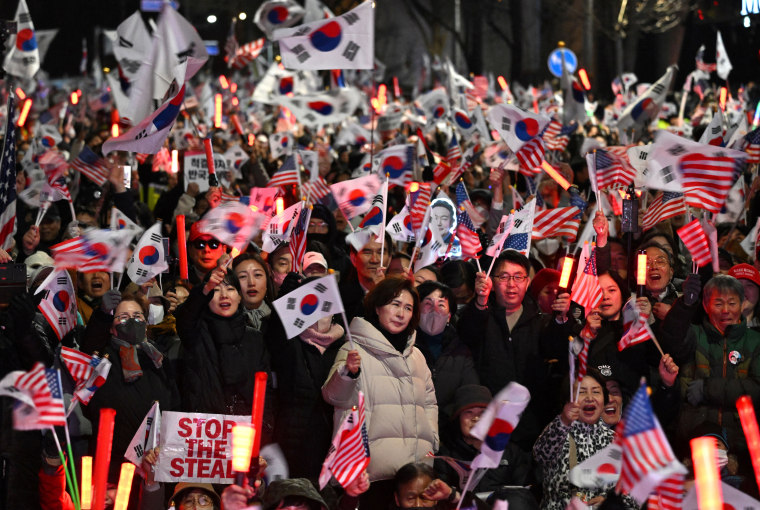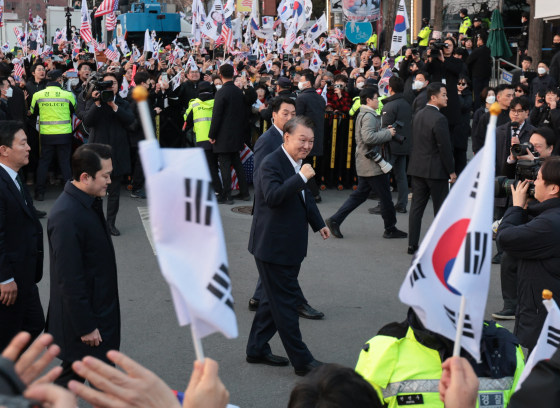SEOUL, South Korea — Impeached South Korean President Yoon Suk Yeol was released from prison on Saturday, deepening political divisions in the key U.S. ally as he faces insurrection charges over his failed attempt to declare martial law.
South Korea, one of the most vibrant democracies in Asia, has been in political turmoil since Dec. 3 when Yoon, citing “anti-state forces,” declared martial law before rescinding the order six hours later after lawmakers voted to reject it.
Yoon’s conservative supporters have latched on to his arguments as well as his unsubstantiated claims of election fraud, strongly echoing the dynamic between President Donald Trump and supporters who say he has been wrongly persecuted by a corrupt judicial system. South Koreans have even adopted symbols and slogans associated with Trump, waving “Stop the Steal” signs at rallies.
Television footage showed Yoon, 64, waving, clenching his fist and bowing to supporters waving South Korean and American flags as he walked out of the detention center in Seoul, before a convoy of black police vehicles returned him to his presidential residence.
“I would like to express my gratitude for the courage and determination of the Seoul Central District Court judges in rectifying this injustice,” he said in a statement as he was released.
“I deeply thank the many citizens who have supported me despite the cold weather, as well as our future generations who have stood by us,” he said.
Yoon added that he was “heartbroken” by the death of a supporter who had set themself on fire in protest.

Lawyers for Yoon said the ruling confirmed that Yoon’s detention was problematic “both procedurally and substantively.”
“We deeply realize how difficult it is to restore the rule of law once it has collapsed,” they said. “From now on, a new journey begins.”
Yoon, who is currently suspended from office, was originally arrested on Jan. 15, making him the first sitting South Korean president to be detained on criminal charges. He still faces an insurrection trial as well as a separate trial to determine whether to uphold his December impeachment by lawmakers in the opposition-controlled parliament.
The Corruption Investigation Office for High-Ranking Officials, the investigative agency responsible for Yoon’s arrest, expressed regret over his release.
The main opposition Democratic Party called Yoon’s release “an act of surrender” and said Yoon was “striking a victorious pose like a triumphant general” as he left the detention center.
“This is the shameless attitude of a man who refuses to acknowledge that he remains an indicted suspect on charges of leading an insurrection,” said Cho Seung-rae, the party’s chief spokesperson.
South Korea is severely polarized between conservatives and liberals, and Yoon’s release was galling for opponents such as Park Hyun-min, a university student.
“He declared martial law, paralyzed the operation of the government, and then exploited loopholes in an unprecedented law, framing the detention as a mistake from the beginning and using that as an excuse to get out of prison,” Park said in a phone interview. “It’s cowardly.”
Kang Min Woo, who was demonstrating in support of Yoon near city hall, said he was “exulted” by Yoon’s release.
“This just is a beginning to deal with anti-state forces,” Kang, a 30-year-old office worker, said in a phone interview.
Kang said he hoped Yoon’s release would pressure the Constitutional Court to overturn his impeachment, noting that Yoon’s approval rating has rebounded in recent weeks. The court is expected to rule later this month.
But for the moment, Kang said, “I am getting ready to move over to the presidential residence to greet the president.”
Beomsu Jo reported from Seoul, Stella Kim reported from Los Angeles, and Jennifer Jett reported from Hong Kong.
